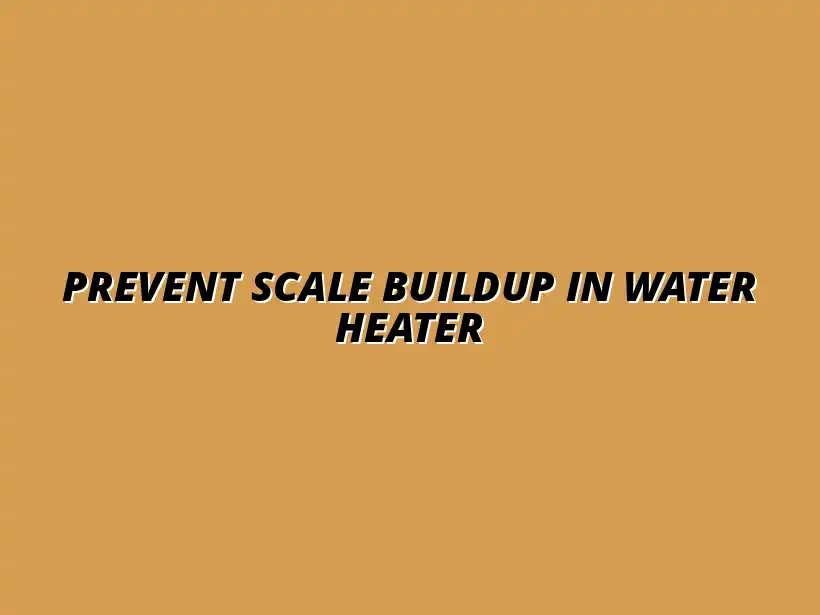
Prevent Scale Buildup in Water Heater
Understanding Scale Buildup in Water Heaters
When it comes to water heaters, scale buildup can be a sneaky little problem. It happens when minerals like calcium and magnesium dissolve in water and then deposit themselves on the heating elements or inside the tank. Over time, this process creates a hard, crusty layer of scale that affects how the heater operates.
Understanding scale buildup is essential for anyone who wants to maintain their water heater efficiently. If you notice that your water heater isn't heating well or is making strange noises, it could very well be due to scale buildup! Regular maintenance, such as flushing your water heater, can help prevent this.
What is Scale Buildup and Its Causes?
Defining Scale Buildup in Water Heaters
Scale buildup refers to the accumulation of mineral deposits inside a water heater. These deposits typically form when hard water is heated, leading to the crystallization of minerals. The thicker the scale, the more it hinders the water heater's efficiency and overall performance.
In short, scale buildup is something you want to avoid! It's crucial to recognize it early to prevent costly repairs or replacements down the line. For more tips on maintaining your entire plumbing system, check out these helpful guides on kitchen plumbing maintenance and preventing bathroom water pressure problems.
Common Causes of Scale Formation
Several factors contribute to the formation of scale in water heaters, primarily related to the quality of the water used. Here are some common causes:
- Hard Water: Water with high mineral content is the primary culprit.
- Temperature: Higher temperatures can accelerate scale formation.
- Usage Patterns: Infrequent use can lead to stagnation and increased scaling.
Knowing these causes can help you take preventative measures to keep your water heater in top shape! Remember to also address potential clogged drains to maintain optimal water flow.
How Scale Affects Water Heater Performance
Impact of Scale on Heating Efficiency
Scale buildup can significantly impact how effectively your water heater performs. When scale accumulates, it acts as an insulating barrier, making it harder for the heating element to warm the water. As a result, your water heater may struggle to reach the desired temperature.
This inefficiency can lead to longer heating times and increased energy consumption. In the long run, this means higher utility bills for you!
Consequences of Neglecting Scale Buildup
If left unaddressed, scale buildup doesn't just impact efficiency; it can also lead to serious damage. Some potential consequences include:
- Reduced Lifespan: Scale can shorten the overall lifespan of your water heater.
- Leaks: Excessive buildup may cause cracks or leaks in the tank.
- Increased Maintenance Costs: You may end up spending more on repairs.
It's clear that neglecting scale buildup can lead to some serious headaches, not to mention financial strain! Addressing corrosion is another crucial aspect of water heater maintenance. So, staying on top of this issue is vital for your water heater's health.
Insights on Long-Term Water Heater Care
Taking care of your water heater can make a huge difference for its performance and longevity. By focusing on preventative measures, you can avoid costly repairs and ensure that your water heater works efficiently for years to come. In this section, I'll share some important insights that can help you keep your water heater in top shape!
Benefits of Preventing Scale Buildup
Preventing scale buildup in your water heater comes with a variety of benefits that can improve not just the appliance but your overall home environment. One of the biggest advantages is that it enhances the lifespan of your water heater, allowing you to get the most out of your investment. With less scale, your heater won't have to work as hard, leading to a more efficient system.
- Enhanced Lifespan: Regularly preventing scale buildup can extend the lifespan of your water heater significantly.
- Lower Repair Costs: Fewer repairs mean more money saved in the long run!
- Better Performance: Your water heater will operate at optimal performance without the added strain of scale.
Enhancing the Lifespan of Your Water Heater
One of the most immediate benefits of preventing scale buildup is the enhancement of your water heater's lifespan. A water heater that is free of scale can last for a decade or more, reducing the need for premature replacements. Regular maintenance, such as flushing the tank, can keep it running smoothly!
Additionally, when scale isn’t allowed to form, it reduces the risk of leaks and other issues that could arise from a strained system. By proactively managing scale, you’re investing in a longer life for your appliance and peace of mind for your household. Remember that an annual water heater inspection is a great preventative measure.
Improving Energy Efficiency and Reducing Utility Bills
Another significant benefit of preventing scale buildup is improved energy efficiency. When your water heater is free of scale, it doesn't have to work as hard to heat water. This leads to lower energy consumption and, ultimately, reduced utility bills!
In fact, you might notice a difference in your monthly energy bills once you start taking care of your water heater properly. Less energy used translates to more money in your pocket, which is always a win-win situation!
Final Thoughts on Water Heater Maintenance
Regular maintenance is key to keeping your water heater in good condition and ensuring that you enjoy all the benefits of a well-functioning appliance. Establishing a routine helps catch small problems before they turn into big ones, and it’s super easy to set up!
Establishing a Routine Maintenance Schedule
Creating a maintenance schedule for your water heater can help ensure that you don’t forget any tasks. Here are some tips for establishing that routine:
- Monthly Inspections: Check for any leaks or odd noises.
- Annual Flushing: Clear out sediment at least once a year.
- Regular Anode Rod Checks: Inspect the anode rod every 6 months.
By sticking to this schedule, you’ll maintain a healthy water heater and prevent scale buildup before it becomes a bigger issue! If you need assistance, consider contacting a local plumber for professional help.
Importance of Professional Inspections and Services
While routine maintenance is essential, sometimes, calling in a professional is necessary. Experts have the tools and knowledge to spot issues that might go unnoticed during regular checks. Plus, they can provide thorough cleaning and maintenance services that might be difficult to do on your own!
- Comprehensive Inspections: Professionals can identify potential problems early.
- Expert Advice: Get recommendations tailored specifically to your water heater model.
- Safety Assurance: Ensure that everything is functioning safely and efficiently.
Encouraging a Proactive Approach to Water Heater Care
Taking a proactive approach to water heater maintenance means you’re prepared for anything! Rather than waiting for a problem to occur, staying ahead of the curve can save you time and money. Knowing when to perform maintenance and when to seek professional help is crucial to ensuring your water heater lasts.
Ultimately, preventing scale buildup and maintaining your water heater is a simple task that pays off in the long run. Together, we can make sure our water heaters continue to function efficiently, keeping our homes comfortable and our bills manageable!




